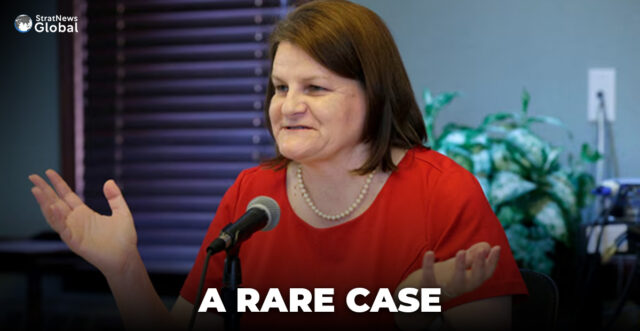U.S. officials on Friday arrested a Wisconsin county judge, accusing her of assisting a man in her courtroom in avoiding immigration authorities, amid growing tensions between the Trump administration and local officials over immigration enforcement.
In a criminal complaint, the U.S. Justice Department said Hannah Dugan, a Milwaukee County circuit judge, refused to turn over the man after immigration agents showed up to arrest him in her courtroom on April 18, and that she tried to help him evade arrest by allowing him to exit through a jury door.
Dugan is charged with obstructing a proceeding and concealing an individual to prevent arrest. She was released after an initial appearance in federal court, records show, and is scheduled to enter a plea on May 15. A crowd formed outside the courthouse, chanting “free the judge now.”
Trump’s Immigration Crackdown
Trump launched a sweeping immigration crackdown after taking office in January, and the Justice Department has directed federal prosecutors to pursue criminal cases against local officials who interfere with the effort. Such resistance was widespread during Trump’s first 2017-2021 term in office.
“No one is above the law,” Attorney General Pam Bondi wrote on social media.
The Trump administration has been locked in an escalating confrontation with federal judges, as several have issued rulings that limit its aggressive use of presidential power in immigration and other matters. State courts have played a less significant role in that dispute.
FBI Director Kash Patel said on social media that agents had arrested Dugan for interfering with the attempted arrest of Eduardo Flores-Ruiz, whom he described as an “illegal alien” now in custody. He later deleted that post, which he made before the case against Dugan was unsealed in federal court in a possible violation of secrecy rules.
“Director Patel’s statement shows that Trump’s FBI is more concerned about weaponising federal law enforcement, punishing people without due process, and intimidating anyone who opposes those policies, than they are with seeking justice,” Milwaukee County Executive David Crowley said in a statement.
Courthouse Confrontation
According to the complaint, Dugan became “visibly angry” and said it was “absurd” when immigration officials arrived on April 18 to arrest Flores-Ruiz at her court, where he faced misdemeanour battery charges related to domestic abuse.
Immigration advocates and some local officials have voiced alarm about courthouse arrests, saying they could discourage witnesses from testifying about crimes.
Dugan ordered the immigration officials to speak with the chief judge and then escorted Flores-Ruiz and his attorney through a door which led to a non-public area of the courthouse, the complaint said.
Carl Ashley, chief judge of the Milwaukee court, declined to comment.
The Milwaukee Journal-Sentinel, citing sources it did not identify, said Dugan steered Flores-Ruiz and his attorney to a private hallway and into a public area.
The complaint said Flores-Ruiz had previously been deported to Mexico.
Dugan was first elected as a county judge in 2016 and before that served as head of the local branch of Catholic Charities, which provides refugee resettlement programs among other services. She spent much of her early career as a lawyer at the Legal Aid Society of Milwaukee, which serves poor people.
A Rare Case
Sitting judges rarely face criminal charges in the United States. Accusations of misbehaviour are typically investigated by state oversight agencies, and 9 out of 10 are allowed to keep their jobs, according to a Reuters review of more than 1,500 such cases.
During Trump’s first 2017-2021 term, federal prosecutors brought criminal charges against a Massachusetts judge accused of impeding a federal immigration arrest of a defendant in her courtroom. Those charges were dropped in 2022, when Trump was out of office.
Barbara McQuade, a former federal prosecutor now at the University of Michigan Law School, said judges have no special immunity, but prosecutors should consider the impact on the U.S. federal system, which allows states to enforce their own laws.
“This seems like a very aggressive exercise of prosecutorial discretion,” she said.
(With inputs from Reuters)





